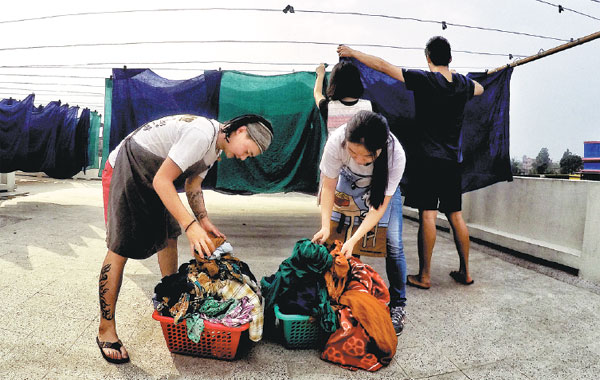Young Chinese advised to delay studies for sake of self-discovery
Time away from school, popular in the West, gets ferocious resistance from Asian parents
Taking a gap year between secondary school and university is a practice that originated in the United Kingdom in the 1960s. In time, it was embraced by young people from many Western countries and has attracted the attention of young Chinese in recent years.
However, a deep-rooted aversion to delaying career progression means the gap year has yet to catch on in Chinese society, observers said.
In the eyes of Deng Xiquan, a researcher with China Youth and Children Center, gap years are a phenomenon that only works after a nation's societal and economic development has reached a certain level.
Young people in China are becoming increasingly familiar with the practice, and some pioneers among them have proved the benefits of taking time off with their own gap year experiences.
High-profile proponents include US President Barack Obama's eldest daughter Malia, who has postponed her enrollment at Harvard University until the autumn of 2017, according to a news release from the White House.
The 18-year-old's decision is not a rare one for high school graduates in the US. According to a report in The Atlantic, Harvard actively encourages the practice, and around 80 to 110 undergraduates choosing to postpone enrollment each year.
Apart from Harvard, some other well-known universities in the US such as Northwestern, Princeton and Tufts also support the practice or favor applicants with gap-year experience, according to the report.
However, in China, high school graduates delaying enrollment to have a year off remains scarcely heard of.
Huang Huanhuan, a self-employed English tutor and translator in Wuhan, Hubei province, didn't take his gap year until 2012, when he was 27 years old, after he had accumulated enough savings and experienced a "career crisis" at work.
Now 31, Huang said many young people in the US see gap years as a kind of "coming-of-age ceremony".
But in China, various factors such as the country's education system, the economic capability of young Chinese and their connection with their families prevents them from taking a year off at a younger age, he said.
"Take economic capability as an example. It's not that difficult for young people in developed countries to earn enough money for a year off by having part-time jobs like serving tables, while in China it's almost impossible," said Huang.
Under such circumstances, young people have no choice but to turn to their parents for help. However, parents can be one of the biggest barriers to their children's gap year dreams, according to Gu Zhengzheng, director of the public promotion department of the Gap Year Foundation, a program administered by the China Youth Development Foundation.
Almost no parents in China would agree to their child's request to suspend their studies, Gu said, as suspension is culturally "intolerable".
This is tied to a strongly held belief in China that even a short break from study can have a knock-on effect on graduation, job-hunting and any future career path.
"In fact, we all need a pause to figure out who we are, what we want to do and what talent we have," Gu said.
But despite many people viewing information on the foundation's website, a disappointingly small number take action and apply, Gu said.
Deng, from the China Youth and Children Center, said the low takeup was understandable as there are too many barriers preventing young people from taking a year off. Apart from financial pressures and parents' disapproval, it is also not easy to suspend studies at many Chinese universities, he said.
zhaoxinying@chinadaily.com.cn
|
Liao Xiaohan (center), hangs up laundry on the rooftop of a hospice in Kolkata, India, with other volunteers during her gap year in 2015. The hospice was established by Mother Teresa in the 1950s. Provided To China Daily |

























